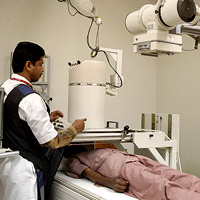HEART DISEASE AND THE IMPORTANT ROLE OF MEDICAL CHECKUP
 | The heart is the center of the cardiovascular system. The heart pumps blood to all of the body's cells through the blood vessels. Heart disease is that occur when the heart and blood vessels aren't working as the way they do. Heart disease, also called cardiovascular disease. This disease includes a variety of problems, including high blood pressure, hardening of the arteries, chest pain, heart attacks, and strokes. Some of these risk factors that cause heart disease are being older and having other people in the family who have had the heart disease. But people that are smoking, having high blood pressure and being overweight and not exercising can increase the risk of getting heart disease. Many people just realize problem with their heart as long as they have pain in chest, a heart attack, or stroke. Some heart attacks are sudden and intense but most heart attacks start slowly, with mild pain or discomfort. People who are affected often aren't sure what's wrong with their heart and wait too long before getting help. When the symptoms occur, the person may need to go to the emergency department of a hospital. According to figures from the World Health Organization, heart disease remains the No.1 cause of death worldwide, responsible for three of every 10 deaths. RTT News reported that 55 million people died worldwide in 2011, including two-thirds from non-communicable diseases: heart diseases, cancers, diabetes, and chronic lung diseases. Tobacco plays a role in many of the top killers including heart disease. You can reduce your risk of heart disease by controlling factors that put you at risk including control your blood pressure, lower your cholesterol check , don't smoke and get enough exercise. You also control your risk of heart disease by making a medical check up singapore appointment every year even if you feel perfectly well. Medical checkup is important to everyone. It involves the use of tests, physical examinations or other procedures to detect disease early in people. This is different from diagnostic tests which are done when someone is already showing signs or symptoms of a disease. It helps you find out if you have a particular disease or condition without any symptoms or signs of disease. Early detection, followed by treatment and good control of the condition can result in better outcomes, and lowers the risk of heart disease. |
Approach
I approach my work with a unique perspective that takes into account your needs and your individual style. My style and technique are broad and flexible, developed over years of training and experience.
Testimonials
"This is sample testimonial from a sample source." -- Sample Client, Location
"This is another sample testimonial from another sample source." -- Sample Client, Location